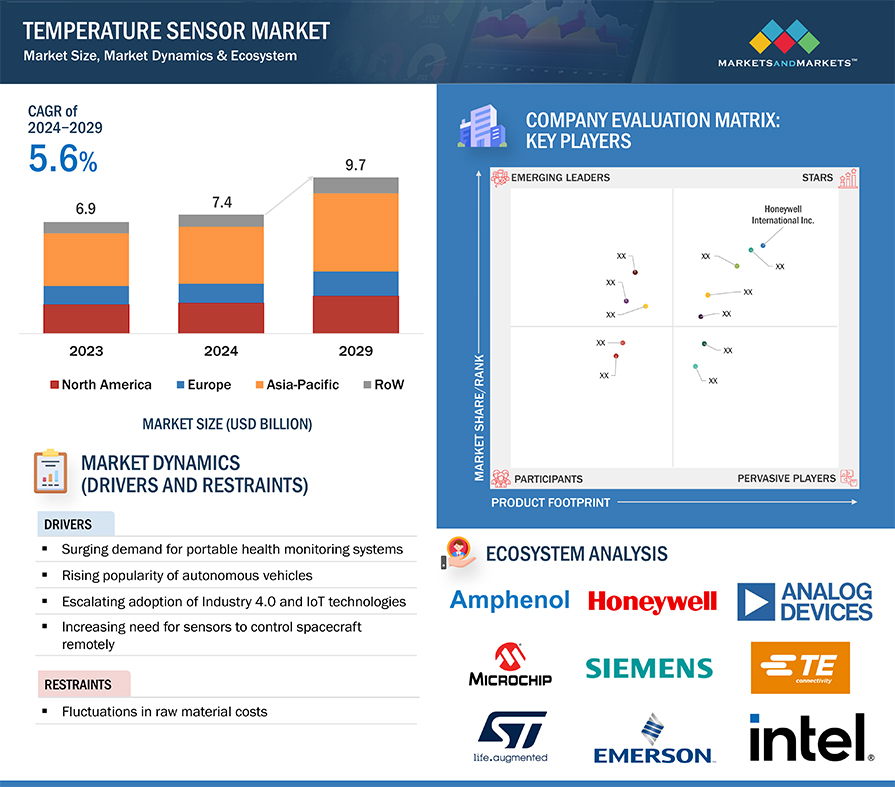The growth of the temperature sensor market attributed by the key factors such as continuous demand for temperature sensors, which are integrated into devices like wearable bands, smartphones, and patient monitoring devices, from industries such as consumer electronics and healthcare For the past few years, the demand for reliable, high-performance, and low-cost sensors has been increasing, leading to the development of new technologies like micro and nanotechnology, which provides benefits such as miniaturization, low power consumption, and mass production.
The temperature sensor market is estimated to be valued at USD 5.9 billion in 2021 and reach USD 8.0 billion by 2028, at a CAGR of 4.5% during the forecast period (2021–2028).
• Informational PDF Brochure :-https://www.marketsandmarkets.com/pdfdownloadNew.asp?id=522
Browse 251 data tables, 70 figures, and an in-depth TOC on “Temperature Sensor Market – Global Forecast to 2028.”Early buyers will receive 10% customization on the report.

Wireless temperature sensors are projected to grow at the highest CAGR for the forecast period
Wireless temperature sensors are expected to grow at a higher CAGR during the forecast period, led by the high demand from the region such as Asia Pacific and RoW. Furthermore, wireless temperature sensors offer benefits such as temperature and other parameter monitoring (such as Humidity, CO2 levels, Ambient light, etc.). The wireless temperature sensors also allow reducing human error, have few compliance issues and collect accurate data for analytics. As a result of these benefits they are being highly demanded by Laboratories, Pharmacies, Warehouses, Manufacturing plants, and Restaurants among others.
Digital temperature sensors to account for the largest share of the market and the highest growth rate during the forecast period
Temperature sensors with digital outputs have several advantages over sensors with analog outputs such as the high speed, and accuracy of detection and are especially suited for remote applications. Digital temperature sensors find applications in medical and aerospace verticals, test and measurement equipment, and industrial automation. Asia Pacific and North America have the highest demand for digital temperature sensors.
Contact temperature sensors to account for largest share of the market
~86% of the total market is expected to be held by contact temperature sensors by 2028. The contact temperature segment is predicted hold a larger market share compared to non-contact temperature sensors segment over the forecast period, due to contact temperature sensors’ application in detecting solid, liquid, or gaseous matter across a wide range of materials. Furthermore, contact temperature sensors are prominently used in the industries such as chemicals, consumer electronics, oil & gas, energy & power, and automotive, due to its low cost, wide temperature range, and high accuracy.
Oil & gas industry is expected to hold the second-largest share in 2028
Oil and gas industry is another key end user for the temperature sensors market and expected to grow at a rapid rate during the forecast period. The oil and gas industry has high demand for temperature sensors, with applications for constant monitoring and measuring to avoid unscheduled disruptions and maintenance.
Asia Pacific is attributed to growing at the highest CAGR in the temperature sensor market during the forecast period, followed by RoW
Asia Pacific accounted for the largest share of the temperature sensor market in 2020. China, India, South Korea, and Japan are the major contributors to the growth of the temperature sensor market in APAC. The temperature sensor market in APAC is likely to be driven by the evolving automotive, medical, and industrial manufacturing companies and the rising demand for temperature sensors from overseas markets of North America and Europe. However, the US, Canada, and Mexico are the major contributors to the growth of the temperature sensor market in North America. North America is one of the most technologically advanced markets for temperature sensors owing to the presence of prominent system suppliers as well as large chemicals, oil & gas, healthcare, and food & beverage companies in the region.
Rest of the world region is estimated to grow at the highest rate during the forecasted period due to the increasing demand from the Middle East and Africa region, while South America region displays the highest growth rate in the temperature sensor market.
Key Market Players
The temperature sensor market was dominated by Honeywell International Inc. (US), TE Connectivity Ltd. (Switzerland), Texas Instruments Incorporated (US), Endress + Hauser Management AG (Switzerland), Siemens AG (Germany), Maxim Integrated (US), Emerson (US), Amphenol (US), Wika Instrument (Germany), and Dwyer Instruments (US).
Study Coverage:
The scope of the report includes detailed information regarding drivers, restraints, challenges, and opportunities for the market, which are the major factors influencing the growth of temperature sensor market. The key industry players have been analyzed in detail to provide insights into their business overviews; solutions and services; key strategies, including product launches and developments, collaborations and recent developments associated with temperature sensors.
Brief information on the research methodology for the report can be found in the report description
Media Contact
Company Name: MarketsandMarkets™ Research Private Ltd.
Contact Person: Mr. Aashish Mehra
Email: Send Email
Phone: 18886006441
Address:630 Dundee Road Suite 430
City: Northbrook
State: IL 60062
Country: United States
Website: https://www.marketsandmarkets.com/Market-Reports/temperature-sensor-market-522.html

